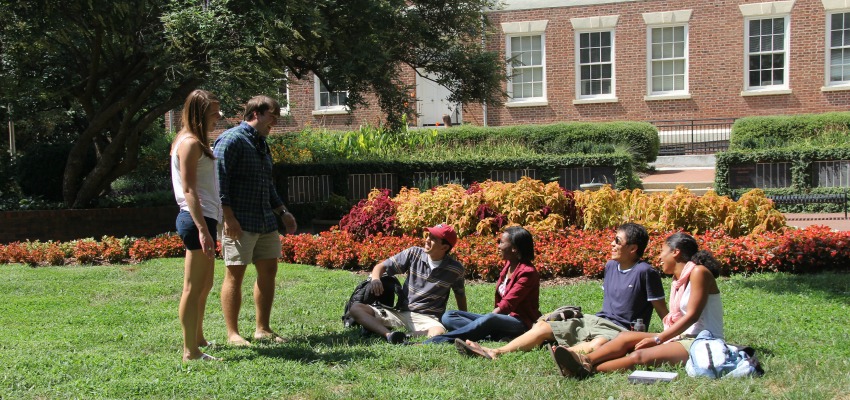Campuses

The Department of Crop and Soil Sciences has a presence on three University of Georgia campuses: Athens, Griffin and Tifton.
Athens
The Athens Campus (College Experiment Station), located in Athens, Georgia, is the primary teaching institution for The University of Georgia. The University of Georgia was chartered in 1785 by the Georgia General assembly. Today at UGA more than 30,000 students pursue 67 undergraduate, master's, doctoral, and professional degrees in 397 majors. The comprehensive and diverse array of courses permit a well-rounded education.
The College of Agriculture, later to become the College of Agricultural and Environmental Sciences, was established by the Morrill Act of Congress in 1862. The Department of Agronomy was established in 1908 and the name was changed to the Department of Crop and Soil Sciences in 1993. Under the College reorganization in 1992, the Crop and Soil Sciences departments at the three experiment stations and in the Cooperative Extension Service were combined into one Department of Crop and Soil Sciences and the facilities at the three locations were designated as campuses.
In addition to the teaching function, the faculty at the Athens campus are internationally recognized for their strong research and graduate training programs. The combination of the teaching and research functions provides the students with excellent educational experiences and opportunities that aren't available in other schools and colleges at The University of Georgia. The research programs at the Athens campus are centered around forage crops breeding and management, soybean breeding, crop biotechnology, weed science, turfgrass management, and environmental soil science. The environmental soil science research programs include soil-fertility, water, and waste management.
Griffin
The Griffin campus (Georgia Experiment Station) enjoys the serenity and quiet of a rural research institute. The 1300+ acre campus, located approximately 40 miles south of Atlanta, is the oldest of three experiment stations. It was founded in 1888 by the Georgia General Assembly under the Hatch Act. The campus has an abundance of indoor and outdoor laboratories for faculty in 7 departments to conduct basic and applied research and to train graduate students. The campus maintains a University of Georgia branch library that houses 32,400 volumes of scientific journals. The campus just recently completed construction of a controlled-environment facility for conducting plant ecology and physiology research under closely controlled environmental conditions. This one+ million dollar facility is one of the finest controlled-environment facilities in the nation.
The research goals of the Crop and Soil Sciences faculty located at this campus involve the improvement of the welfare of Georgia's citizens through problem-oriented and fundamental research programs directed primarily to the Piedmont area of the state. The strength of the research programs at this campus results from the high-quality facilities and support staff. Major research programs include feed grain production, turfgrass production and management, and emerging crops development. Georgia's nationally recognized variety testing program is centered out of this campus. This program was developed to assist Georgia farmers in selecting the best cultivars to plant. The feed grain production program includes strong cultivar development and crop management research. This strong interdisciplinary research and Extension program is recognized nationally.
The campus location, in the shadow of expanding metropolitan Atlanta, has fostered the development of the Center of Urban Agriculture. Faculty in the Department of Crop and Soil Sciences have developed one of the foremost turfgrass research and Extension teams in the United States. The interdisciplinary team develops and transfers basic and applied research information necessary for environmentally sound turfgrass management. Cultivar and germplasm development is a strong component of this program. Department faculty at this campus recognized the importance of identifying the impact of crop management systems on the environment. Research is conducted on the fate of pesticides following application to turfgrass and movement of organic compounds in the atmosphere. Although the faculty at this campus are heavily involved in research, they are often called upon to participate in teaching at the Athens campus, offering courses and participating in team-taught courses which can be facilitated by distance-learning technology. The Griffin campus Crop and Soil Sciences is also home to the Biometeorology Program, also called the Lab for Environmental Physics. In that program, scientists, post docs and students study the interaction between our atmosphere and climate and vegetation and soils. It is a pluridisciplinary program grounded in a combination of field measurements and atmospheric modeling.
Tifton
The Tifton campus (formerly, Coastal Plain Experiment Station) is located at the heart of the row crop farming region in the southern part of the state. The Coastal Plain Experiment Station was established by an Act of the General Assembly of Georgia, approved on August 18, 1918. All of the tobacco and 99% of the peanut production is in the Coastal Plain. A major portion of the corn, cotton, soybean, hog, cattle, and vegetable production and fruit and nut sales is in the Coastal Plain of Georgia. The department faculty at this campus has enjoyed a close association with highly trained state and USDA scientists. This association on cooperative projects provides research information applicable to agriculture far beyond the Southeast, and even beyond the continental United States.
Research programs in the Department of Crop and Soil Sciences range from traditional crop breeding and management to food and environmental safety. The breeding and genetics programs include peanuts, turf, forages, cotton, and pearl millet. The scientists develop environmentally sound cultural practices to obtain ideal production from these crops. Although headquartered at the Griffin campus, approximately one-half of the state's variety testing program is conducted at this campus. The program evaluates most commercial varieties of crops that may be grown in the area to help producers choose the proper variety for their conditions. Extensive research has been conducted on chemigation (application of chemicals via irrigation systems). Additionally, the scientists determine the soil characteristics and cultural practices required for optimum crop production and minimal environmental impact. They investigate various aspects of pesticide residues and food safety to assure that the products produced in Georgia are wholesome and safe for consumers.
